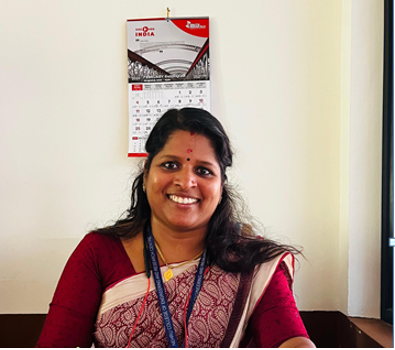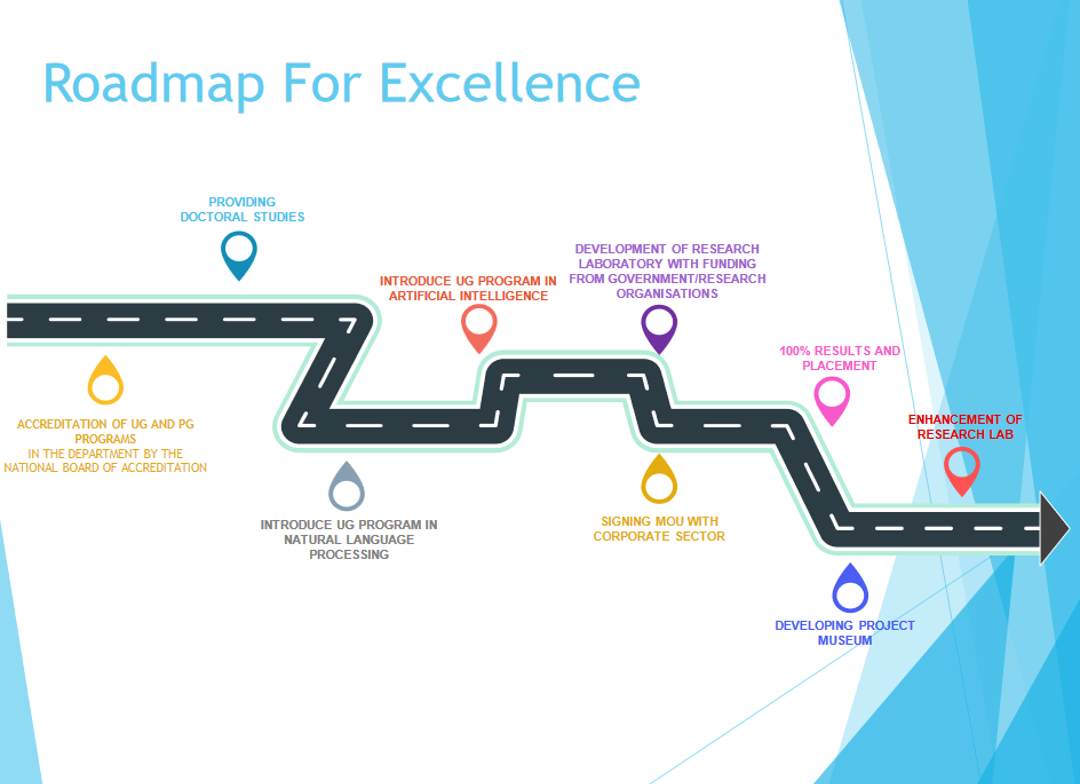About
Artificial intelligence (Al) is a technology that allows machines to simulate human behavior and Machine learning (ML)
is a subdomain of Al that allows machines to automatically learn from past data without explicit programming, meaning
the machine would automatically learn from the past activities. Together, Al and ML create human-like intelligent computer
systems to solve complex problems.
The field of artificial intelligence and machine learning harbors a wide range of opportunities all around the world.
Numerous advancements are shaping the world and there are still many innovations that are yet to come forth in this,
particular field. As Artificial Intelligence is taking particular field. As Artificial Intelligence is taking over manual
work all around the world the career scope in this sector is expanding day by day. This trend has encouraged a lot of
students to join the B.Tech Artificial Intelligence & Machine Learning colleges in india B.Tech Artificial Intelligence &
Machine Learning (Al & ML) has become one of the most sought-after programs in the modern world owing to its promising and
remunerative scope. Since this degree has applications across fields and industries, the opportunities expand manifold.
With this B. Tech Artificial Intelligence and Machine Learning degree, the students can gain theoretical and practical
knowledge and can utilize this knowledge to shape various career opportunities
HoD’S MESSAGE

Sajitha A S
HoD in charge
Department of Artificial Intelligence & Machine Learning (AI &ML) is established in the year 2022. The current intake of UG program is 60.The Department of CSE-Artificial Intelligence & Machine Learning at Nehru college of Engineering and research centre is strongly committed to impart innovative and quality technical education with high standards. The field of Artificial Intelligence & Machine Learning is a diverse field which has a significant role in the development of cutting edge technology. The main focus of the department is to produce graduates with the expertise in Machine Learning technology, and department has adopted outcome-based education to help students to achieve this goal. The department provides numerous opportunities to students to interact with Industry Professionals and hone up their skills. This enables students to analyse real life problems and develop solutions for the same.
The department has qualified, experienced & committed teaching faculty members with various specializations. All faculty members continuously monitor the overall development of the students through personal guidance, mentoring & Counselling. To empower the students with multi-dimensional skills, department conducts guest lectures by well-known academia and industry persons. These lectures provide students the industry perspective and empower them to think beyond regular course curriculum and possibly instil in them the concept to start on entrepreneurial journey.
VISION
Producing Highly Competent, Innovative and Ethical Computer Science and Engineering (AIML) Professionals to facilitate continuous technological advancement.
MISSION
- 1: To impart Quality Education by creative Teaching Learning Process.
- 2: To promote cutting-edge Research and Development Process to solve real world problems with emerging technologies.
- 3: To inculcate Entrepreneurship Skills among Students.
- 4: To cultivate Moral and Ethical Values in their Profession.
PROGRAM EDUCATIONAL OBJECTIVES (PEO’S)
- PEO 1: Graduates will be able to Work and Contribute in the domains of Computer Science and Engineering (AIML) through lifelong learning.
- PEO 2: Graduates will be able to Analyze, design and development of novel Software Packages, Web Services, System Tools and Components as per needs and specifications.
- PEO 3: Graduates will be able to demonstrate their ability to adapt to a rapidly changing environment by learning and applying new technologies.
- PEO 4: Graduates will be able to adopt ethical attitudes, exhibit effective communication skills, Team work and leadership qualities.
PROGRAM OUTCOMES (PO’S)
Engineering Graduates will be able to:
- PO 1. Engineering knowledge: Apply the knowledge of mathematics, science, engineering fundamentals, and an engineering specialization to the solution of complex engineering problems.
- PO 2. Problem analysis: Identify, formulate, review research literature, and analyze complex engineering problems reaching substantiated conclusions using first principles of mathematics, natural sciences, and engineering sciences.
- PO 3. Design/development of solutions: Design solutions for complex engineering problems and design system components or processes that meet the specified needs with appropriate consideration for the public health and safety, and the cultural, societal, and environmental considerations.
- PO 4. Conduct investigations of complex problems: Use research-based knowledge and research methods including design of experiments, analysis and interpretation of data, and synthesis of the information to provide valid conclusions.
- PO 5. Modern tool usage: Create, select, and apply appropriate techniques, resources, and modern engineering and IT tools including prediction and modeling to complex engineering activities with an understanding of the limitations.
- PO 6. The engineer and society: Apply reasoning informed by the contextual knowledge to assess societal, health, safety, legal and cultural issues and the consequent responsibilities relevant to the professional engineering practice.
- PO 7. Environment and sustainability: Understand the impact of the professional engineering solutions in societal and environmental contexts, and demonstrate the knowledge of, and need for sustainable development.
- PO 8. Ethics: Apply ethical principles and commit to professional ethics and responsibilities and norms of the engineering practice.
- PO 9. Individual and team work: Function effectively as an individual, and as a member or leader in diverse teams, and in multidisciplinary settings.
- PO 10. Communication: Communicate effectively on complex engineering activities with the engineering community and with society at large, such as, being able to comprehend and write effective reports and design documentation, make effective presentations, and give and receive clear instructions.
- PO 11. Project management and finance: Demonstrate knowledge and understanding of the engineering and management principles and apply these to one’s own work, as a member and leader in a team, to manage projects and in multidisciplinary environments.
- PO 12. Life-long learning: Recognize the need for, and have the preparation and ability to engage in independent and life-long learning in the broadest context of technological change.
PROGRAM SPECIFIC OUTCOMES (PSO’S)
- PSO 1: Ability to Formulate and Simulate Innovative Ideas to provide software solutions for Real-time Problems and to investigate for its future scope.
- PSO 2: Ability to learn and apply various methodologies for facilitating development of high quality System Software Tools and Efficient Web Design Models with a focus on performance optimization.
- PSO 3: Ability to inculcate the Knowledge for developing Codes and integrating hardware/software products in the domains of Big Data Analytics, Web Applications and Mobile Apps to create innovative career path and for the socially relevant issues.
